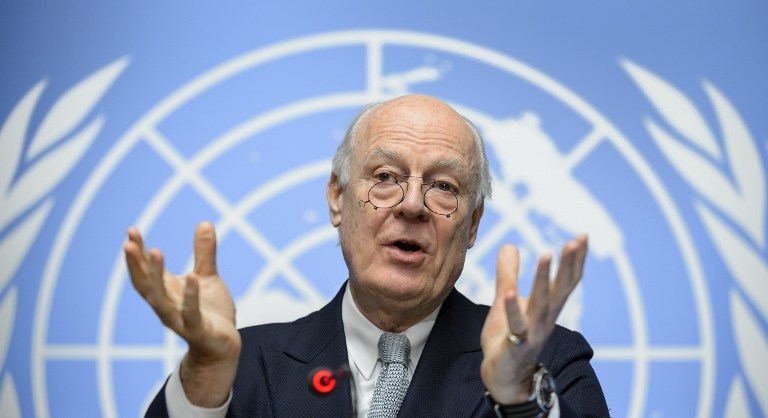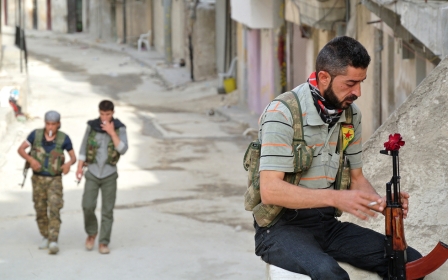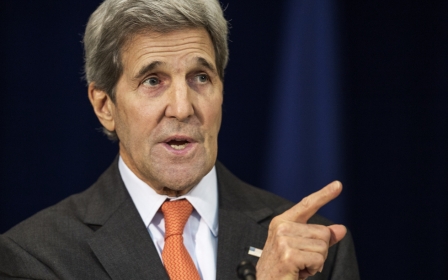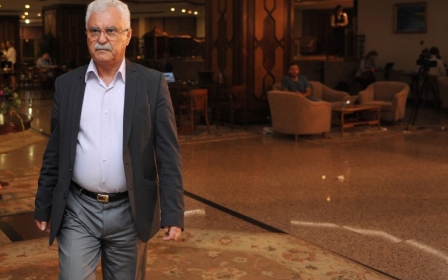Opposition undecided as UN envoy sends out invitations to Syria talks

The UN’s Syrian envoy on Tuesday sent out invitations for peace negotiations in Geneva even as the leading Syrian opposition coalition was yet to announce whether it would attend the talks.
Staffan De Mistura issued invitations to 15 members of the opposition negotiating team and 12 consultants, according to Charles Lister, an expert on the near-five-year Syrian conflict. The individual names of those invited were not immediately known and the UN had not responded to MEE's questions about the list late on Tuesday.
The talks had been scheduled to begin a day ago on Monday, but preparations for them have been overshadowed by weeks of intense disagreement over which opposition groups should attend.
On Tuesday, the High Negotiations Committee (HNC), a Syrian opposition coalition formed after talks in Riyadh last month, were meeting in the Saudi capital to decide whether to attend.
Late in the evening, the HNC's spokesperson Salem al-Muslet reportedly told Sky News Arabia that the group will continue talks on Wednesday when they plan to announce their decision.
Russia has pushed for the inclusion of Syria’s Democratic Union Party (PYD), the Kurdish group fighting in northeast Syria, and its own list of political opponents of the Syrian government, either as part of the HNC or a second opposition delegation.
They have also pushed for the exclusion of the Jaish al-Islam rebel group, calling it a terrorist group.
Turkish officials have said they strongly oppose the involvement of the PYD, and its military wing, the People's Protection Units (YPG), from taking part in the talks, and said on Wednesday that it will boycott Geneva if they are invited. Ankara considers both groups to be offshoots of the outlawed Kurdistan Workers' Party (PKK).
The Saudi-backed opposition, which has named Mohammed Alloush, a member of Jaish al-Islam, as one of its chief negotiators, has rebuffed attempts to influence its line up and insists it should be the sole opposition delegation at the talks.
The group has also indicated that it would not participate at Geneva, even in indirect talks, until Russian air strikes were halted and access opened for the delivery of humanitarian aid to besieged areas.
On Tuesday, Jan Egeland, the head of the Norwegian Refugee Council and former UN under-secretary general, urged rival parties to "tear down the Berlin Wall of hindrances they have built between us who can help", to stop playing "games" and agree in Geneva on a nationwide humanitarian pause and ceasefire.
Egeland's comments are likely to be met with scepticism from members of the Syrian opposition who have highlighted in recent weeks that UN resolutions already give aid agencies access to areas in need of humanitarian aid and have criticised the UN for continuing to ask permission for access from the Syrian government.
Tensions over the talks hit high gear over the weekend after a meeting between members of the HNC and US Secretary of State John Kerry in which a member said he threatened to pull political and military support from the opposition if they did not participate.
Members of the delegation also reportedly told Al-Hayat journalist Ibrahim Hamdidi that Kerry told the HNC that following a meeting he had with Russian Foreign Minister Sergei Lavrov last week, President Bashar al-Assad could still run for re-election and there was no timetable for his departure.
On Tuesday, US Envoy to Syria Michael Ratney, however, downplayed reports that Kerry had pressurised the group, saying there had been a misunderstanding, according to Al-Hayat.
Stay informed with MEE's newsletters
Sign up to get the latest alerts, insights and analysis, starting with Turkey Unpacked
Middle East Eye delivers independent and unrivalled coverage and analysis of the Middle East, North Africa and beyond. To learn more about republishing this content and the associated fees, please fill out this form. More about MEE can be found here.




